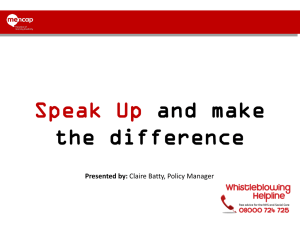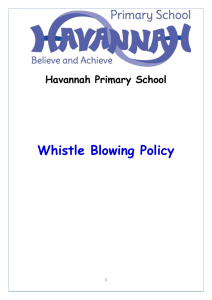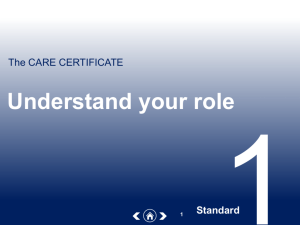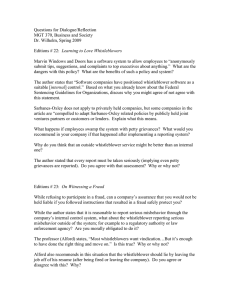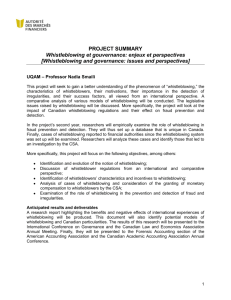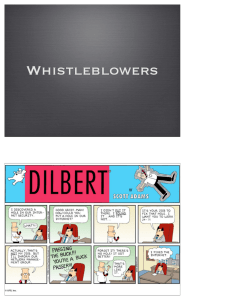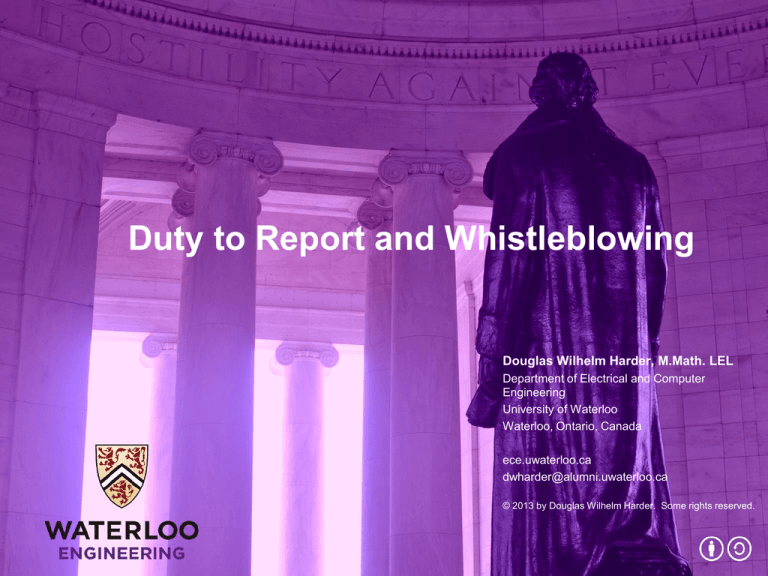
Duty to Report and Whistleblowing
Douglas Wilhelm Harder, M.Math. LEL
Department of Electrical and Computer
Engineering
University of Waterloo
Waterloo, Ontario, Canada
ece.uwaterloo.ca
dwharder@alumni.uwaterloo.ca
© 2013 by Douglas Wilhelm Harder. Some rights reserved.
Whistleblowing
Outline
An introduction to engineering law and ethics:
ethical theories, code of ethics and misconduct
whistle blowing, conflict of interest and sexual harassment
health and safety, diversity, workplace equity and environment
Charter of Rights and Freedoms
torts, contract and intellectual property
Continuation of studies of professional practice:
history
Professional Engineers Act and Regulation
licensing, discipline and enforcement
Whistleblowing
Comment
A significant amount of this topic is taken directly or
paraphrased from PEO’s GUIDELINE: Professional
Engineering Practice, a document you can download
from PEO’s web site
Whistleblowing
Duty to Report
Engineers are responsible for ensuring that the products
that we design and develop are safe for the public
What happens if company policy or culture is such that it
is inevitably leading to the harm
Whistleblowing
Whistleblowing
We will look at how and when to blow the whistle, what
level of “safe” is good enough, and possible
repercussions of blowing or not blowing the whistle
Whistleblowing
Duty to Report
Any time engineers see a defect in a design, an unsafe
plan, a faulty conclusions in an analysis, or an
incomplete evaluation; or hear poor advice or insufficient
direction within their practice, they are exercising the
duty to report
Whistleblowing
Duty to Report
The duty to report relates to situations related to
engineers’ ability to apply judgment based on their
professional training, experience and competence
This duty is applied when engineers are engaged in the
practice of professional engineer
Whistleblowing
Duty to Report
When engineers see a situation that compels them to
report an issue, their primary duty is to report
– Engineers are not required to solve problems in such cases
unless they have the authority to make the required changes
– In many cases, the issues will be in the purview of others
– It is the responsibility of engineers to make those who have the
appropriate influence aware of the issue
Whistleblowing
How Far to Go?
When do you go outside the privacy of a contract or
employment?
– Only when if is a matter that affects the public welfare or public
interest
Whistleblowing
What Steps Should Be Taken?
An engineer would proceed as follows:
1. Ensure the problem is real and that the harm is a reasonable
consequence of the issue
•
The severity of the consequences will dictate the urgency required
2. Determine who should be informed
•
As a mater of fairness, loyalty and being a faithful trustee or agent,
one would always approach one’s employer or client first
3. Advise the employer or client and, if possible, provide possible
remedial steps
•
Ensure that the individual is clearly aware of the consequences
Whistleblowing
What Steps Should Be Taken?
At this point, the engineer must decide:
“Will the consequential harm affect the public welfare?”
If the answer is no, it is an internal issue and your
responsibilities are met
Whistleblowing
What Steps Should Be Taken?
Which of the following situations are purely internal and
do not affect the public welfare?
– A colleague is engaging in racist behaviour, ignoring or belittling
those from other cultures or ethnicities
– The design will have significant consequences on the
extensibility of the system, thereby necessarily incurring
significant additional expenses in the future
– There is evidence of bribery between your employer and another
client
– A mechanical engineer is designing the framework for a software
system
– An engineer approved a report prepared by a subordinate that
he didn’t have time to read
– Any behaviour that is illegal
Whistleblowing
What Steps Should Be Taken?
If there is the potential for harm to the public welfare, the
engineer should take the following additional steps:
4. Follow up with the employer or client within a reasonable
period of time
•
•
You should inform them that you are obligated to report if the issue
is not addressed appropriately
You are required to do so under the Professional Engineers Act
5. If the issue is not addressed, discuss the matter with
colleagues
•
Again, you should maintain privacy of contract — talk to your
fellow engineers in house where at all possible
6. If the issue is not resolved, follow up with higher management
•
Again, reiterate that you are obligated to report under the Act
Whistleblowing
What Steps Should Be Taken?
If the issue is not being addressed, it may be necessary
to go external
– What about any contractual obligations, employment contracts,
or non-disclosure agreements?
Whistleblowing
Non-disclosure Agreements
A non-disclosure agreement is a contract between the
parties and an agreement is legally enforceable only if it
has legal purpose
– If there is an imminent threat to life, health, property, economic
interests, the public welfare or the environment, any agreement
requiring confidentiality on such matters, it will no longer have
legal purpose
– Question: Threats to life, health, property and the environment
can be more objectively quantified; what about threats to
economic interests and the public welfare?
Whistleblowing
Whistleblowing
If you feel that there is an immanent threat to the public
welfare, the next step is to blow the whistle
– The first step is to approach a government regulatory body or a
government ministry or ombudsperson
– There must be an extreme situation before an engineer would
approach either the media or a private watchdog agency
Any professional engineer can always contact PEO at
this step of the process
Whistleblowing
Duty to Report Incompetence
or Professional Misconduct
When must a professional engineer report professional
misconduct or incompetence on the part of another
engineer?
– The Act only requires reporting when a professional engineer
determines a situation is either unsafe or detrimental to the
public welfare
– If, however, the incompetence or misconduct of a professional
engineer becomes threatening, an engineer would issue a
complaint as any other person
Whistleblowing
When?
How often will engineers find themselves in a position
where they will be confronted with corrupt and
unprincipled managers or executives bent on throwing all
caution and care to the wind?
Reality:
– It is unlikely that even one student in this class will ever see such
behaviour in his or her career — not impossible, but highly
improbably
Whistleblowing
When?
Samuel C. Florman is a professional engineer and
philosopher points out that in such extremely rare cases
(as dramatized in Hollywood), most engineers would
realize that such behaviour is unethical and almost
certainly illegal
“What could be more obvious. And, once having been said, what
could be more trite”
Whistleblowing
Care in Engineering
The very nature of the engineering profession is directly
associated with mitigating harm, and when that fails,
people, property and the public are injured
– Does this injury occur because of unethical behaviour?
The more likely causes are inaccuracy, carelessness
and inattentiveness
– Only occasionally is lack of scientific or mathematical
understanding the cause of such harm
Whistleblowing
Care in Engineering
Consequently, engineers must, by their training and
obligations, take greater care
Alpern’s principle of proportionate care:
“When one is in a position to contribute to greater harm or when
one is in a position to play a more critical part in causing harm
than is another person, one must exercise greater care to avoid
doing so.”
Whistleblowing
Care in Engineering
Unfortunately, there are other issues: in any large
organization, there is the invariable dilution of individual
responsibility
Engineers will change projects, teams, divisions and
companies and, these days, seldom will they hold the
same position for many years
– Dennis Thompson describes this as a “problem of many hands”
Alternatively, should a single individual be held
responsible for what is often a systemic problem?
Whistleblowing
References
[1]
[2]
[3]
[4]
[5]
D.L. Marston, Law for Professional Engineers, 4th Ed., McGraw Hill, 2008.
Julie Vale, ECE 290 Course Notes, 2011.
Wikipedia, http://en.wikipedia.org/
Ibo van de Poel et al., Philosophy and Engineering: An Emerging
Agenda, Springer, 2010
Professional Engineers Act,
http://www.e-laws.gov.on.ca/html/statutes/english/elaws_statutes_90p28_e.htm
[6]
Ontario Regulation 941,
http://www.e-laws.gov.on.ca/html/regs/english/elaws_regs_900941_e.htm
These course slides are provided for the ECE 290 class. The material in it reflects
Douglas Harder’s best judgment in light of the information available to him at the
time of preparation. Any reliance on these course slides by any party for any other
purpose are the responsibility of such parties. Douglas W. Harder accepts no
responsibility for damages, if any, suffered by any party as a result of decisions
made or actions based on these course slides for any other purpose than that for
which it was intended.

